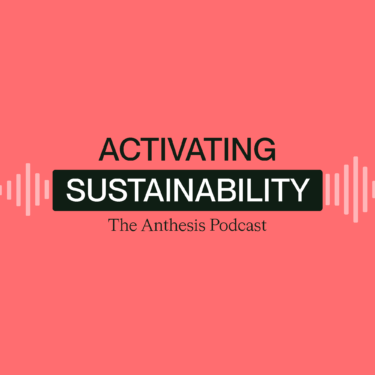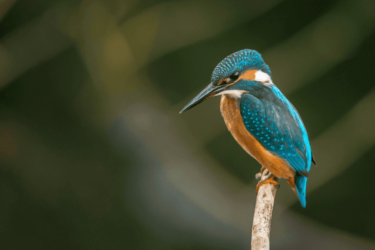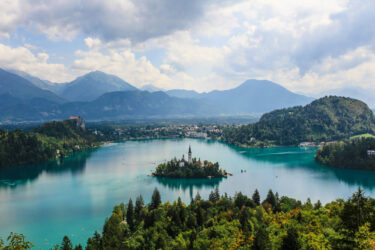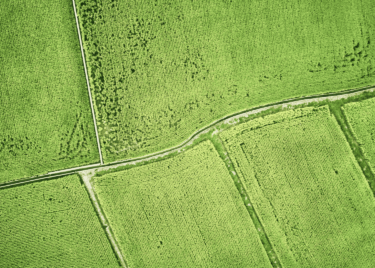
Speakers
Chris Peterson, Director
Jake Lipton, Partner, Wallbrook
Courtney McCorstin, Principal Consultant
Related Topics
Share this episode
In this JUST IN episode of our Activating Sustainability series, our host Chris Peterson is joined by Jake Lipton, Partner at Wallbrook, and Courtney McCorstin, Principal Nature and Climate Risk Consultant, to discuss key takeaways from Climate Week NYC.
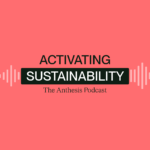
Read the transcript
Chris: Hello and welcome to Activating Sustainability, the anthesis podcast. I’m your host Chris Peterson. With all the buzz around Climate Week, we thought it’d be great to do just a really quick record with a couple of Anthesians who were there and experiencing to get their take on how the week has been, what they’ve learned and where things are going. So I’m really pleased to be joined by Courtney McCorstin, who is a principal nature and climate risk consultant Anthesis in the Climate Practice, and Jake Lipton, who is a Partner with Wallbrook and Head of the US business who is one of the newest organizations to partner with Anthesis. So welcome to you both. Thank you so much for joining. And maybe just before we hop into it, Jake, do you want to just give us kind of super quick introduction of Wallbrook for anyone that wasn’t familiar with them.
Jake: Yeah, sure. Thanks so much, Chris. Thanks for having me on. It’s a pleasure to be here. So, yeah, we as Wallbrook, we’ve been part of the Anthesis family since May. Walbrook is an investigations firm that specializes in ESG and human rights. We set up the firm just over five years ago. Got certified as a B Corp and really specialize in facilitating responsible business practices worldwide and we do that by helping our clients identify material ESG human rights risks, especially as pertaining to this sort of G&S aspects of ESG to ensure their suppliers, any assets they acquire are operating with the sort of high standards of integrity and governance. So it’s a pleasure to be here and look forward to sharing a few impressions about our experiences over Climate Week in New York.
Chris: Great. Yeah, So excited to have you and the team in and to kind of dive into this conversation. So maybe to kick us off there, Courtney,, do you wanna just give us kind of your impression of what it has been like over the week?
Courtney: Yeah, definitely. So I think, you know, really a common theme we see coming out of a lot of these conferences is that overall feeling of positivity and the vibrancy of just having everyone who has a really a common goal and common passion be together in one collective space discussion discussing the issues that you know are present in our society. So I think that’s kind of been the main take away. It was, it was a great week. A lot of conversations going on. You know we had Climate Week going on. There was the Nature Positive Hub. There was also the World Biodiversity Summit and then the UN General Assembly. So a lot of people really all congregating in New York for the full week just to discuss and focus on this common.
Chris: Great, Jake. Is that your experience is?
Jake: Yeah, I mean I would echo that. I think, uh, selfishly as a native New Yorker, we always think that we’re at the center of the world, but certainly for the past week plus it has felt like that even more so as with respect to climate and obviously, you know, the amount of heads of state. More leaders who were in town, which, although it made traffic even worse than it usually is, certainly facilitated a lot of, you know, really fulsome discussions about how we as consultants and by extension responsible corporate citizens, can truly find practical solutions to, you know, address the climate crisis. Um, so happy to talk more about sort of some impressions we had just from our meetings and conversations with clients over the past week. But I think overall, you know sitting here on a Friday on a sunny day, you know we are really encouraged about a lot of momentum that seems to be building in this, in this space, not only in New York, but you know in the US and hopefully the world more generally.
Chris: Yeah. It’s always exciting to see groups coming together and of course I think that term vibrancy is such a great way to put it. That’s always how it feels in New York. It’s nice when it’s focused in on sustainability topics. So you know, there have been so many headlines that somebody that wasn’t there that we’ve been seeing coming out of it, et cetera. I’d be curious to hear from you two as you kind of navigated through that & experienced it over a couple of days highlights of things that you feel are really kind of critical for people to be aware of as they reflect on the week.
Courtney: Yeah, I can jump in here. I think for me the biggest highlight of this week is the fact that nature is really having its moment. You know when we think about historically Climate Week, it used to really be fully focused on climate, but this week we saw a massive shift in integration of more of those nature and social aspects. And so I think that that was really an exciting thing to be a part of and to be there while that was happening, you know on Monday with the launch of a TNFD. So the task force on nature related financial disclosures happened at the New York Stock Exchange, so talking about nature and biodiversity really at the hub of finance really showing that shift and move towards more of a bioeconomy I think was a really critical piece. And something else that I will say is at the start of these are at the center of these conversations where we’re talking about nature also the integration of the social aspect and so there’s a lot of conversations when we’re talking about nature and nature based solutions of incorporating the people component, so indigenous people’s local communities at the center of the solutions that we’re proposing for the climate crisis. So I’ll stop there.
Jake: Yeah, maybe I can sort of pull on that thread a little bit, especially as it pertains to kind of the intersectionality of, you know, climate risks and things like labor rights risks and just generally human rights, you know, basic concepts of human rights and a lot of human rights due diligence is really, you know, the work that we do is identifying the impact on vulnerable populations and helping to find solutions to ultimately mitigate them. And you know for clients that can mean things and you know having awareness of if you have within your supply chain or any assets. Require, you know, workers in the global south and outdoor factory settings ensuring that there’s heat policies in place to, you know, really protect them from rising temperatures so that they can work in a place that’s safe and secure and things like land usage. And I think there’s just awareness building of, you know, if you acquire land who does it belong to? Who was living there, who’s currently living there, who’s on the surrounding area and what impact does that have on, you know, indigenous populations. So you know, I think obviously there’s sort of well established frameworks to measure, you know, environmental data measuring the human impact. More challenging, but I do think that there is at least recognition of the need to incorporate that into a lot of this analysis and really the best way to do that is to physically go and visit sites, talk with people on the ground to meet with people so that you can get local perspectives in a more unfiltered way to, you know, inform how you approach and consider on the ground risks.
Courtney: Yeah, yeah, I’ll add on to that as well. I think what was interesting is it’s looking at that, you know not only the impact that you have on these school communities. But a lot of the conversation was also how do we incorporate their perspectives and drive the solution. So ensuring that, you know, when we’re talking about solving the climate crisis, it’s incorporating aspects like nature but also people. And so one of the panels that I went to was really talking about trusting Indigenous people, they’ve been doing this for much longer than we have. They know the solutions. They know what needs to be done in order to sustainably manage the land. You know, they’re very much more connected to the land than someone who’s not living there, hasn’t been living there. And so really trusting their perspective. And to all of this, I think, has been a really critical aspect.
Chris: Yeah,I think it’s really interesting to hear, you know we’re talking about Climate Week and I know you both made the point of it’s fascinating to see how these additional issues are being pulled into that right and the social aspect, the biodiversity of nature elements etcetera. You know, maybe, Jake reflecting on the social side and it would be great to hear from your perspective. Do you see a significant shift in the way that that’s being viewed or experienced at the events and really being thought about with that? Do you feel like we’re at the early stages of that? You know, with TNFD, do we feel that we’re at the kind of concluding stage or we’re starting to catch up to where we are in climate? Maybe Jake, do you want to start first on the social side?
Jake: Yeah, I think the perspective I’d share there is there’s broad recognition among financial sponsors and corporate clients that we’re moving from a regime around whether it’s ESG or Climate that was largely disclosure based to one that’s more regulatory based and I think with that evolution comes you know the imperative on us and on our clients to not only sort of intake data but also corroborate and verify information and. that I think is obviously a burden, but it also drives impact because I think when it comes to let’s say. Um. Material ESG disclosures to add data around climate. Ultimately if there’s a lack of integrity in those disclosures, as in they are not accurately reflecting let’s say the impact of your scope to our Scope 3 emissions or not accurately reflecting how you’re impacting workers in your supply chain or local communities on the ground, I think. Ultimately, you won’t be able to have the impact for your intended impact and not only will your stakeholders ticket to see through that, but there could be regulatory consequences, particularly as things continue to evolve and that’s based in Europe and in the US as well.
Courtney: Yeah. And on the nature perspective, I think I agree with all of that. You know the mandatory to or the voluntary to mandatory shift is something that I think will very closely follow what we’re seeing with climate. So with climate, you know we had TCFD, the task force on climate-related financial disclosures. Now following that we have TNFD. we assigned to those targets for climate and now we have science based targets for nature. And so we’re taking a very similar approach and something that I think was a common theme we heard was we’re trying to learn almost from the mistakes of climate or learn so we can go faster than climate, we don’t have the luxury of time with nature and we can’t wait another 20 years to get to the space and to the maturity that we are right now with climate, with nature. And so learning and taking the same pathways, I think it’s something we’re going to see in the next couple of years. The ISSB you know, already hinting at they’re going to be focused on nature in the next coming years. And so I think that’s a big highlight of really nature is going to be part of the conversation. And really when we’re thinking about this, one thing to keep in mind is we don’t want to be going through this and say okay climate, they’re here and nature is over there. It needs to be thought of as an integrated approach. These two play off of each other. You know what impacts nature can impact climate and vice versa. And so we really need to think about them as an integrated solution, even when we’re thinking about risk assessments. You know, if you go through a climate risk assessment, you should also look at that from the nature and social perspective. One risk can exacerbate another risk and they can have compounding implications. So making sure you’re looking at both of them in the same vein in order to fully understand what is your company-wide risk exposure, you can’t just look at climate you know it has to be looked at.I thought that the social and nature component as well.
Chris: Yeah. Maybe that’s a great transition to kind of the final question we have, which is, you know, there’s so much going on. I think, you know, a lot of our clients, partners, people we work with, there was a certain satisfaction of like, OK, we’re just focusing in on climate, we’re getting our arms around that. Now we can breathe and appropriately we’re now bringing in kind of those next round rules right of like Jake shared, really understanding where the impacts on the ground for indigenous populations, global impact from the social perspective, Courtney, the nature side. So we’d love to hear from both of you as you reflect on this week’s attention that’s been on New York. Climate, social nature. What are one or two kind of actions that you would kind of recommend to the listener to kind of carry their efforts forward? Maybe, Jake, do you wanna pick that up?
Jake: Sure. I mean, I think the sort of broader theme I would underscore is we’ve done a really good job throughout this week and a lot of folks have been diagnosing the problem of building broad based awareness of what the problems are. Now I think it’s time to implement solutions and take actions that will, you know, address the risks and ultimately. Do some sort of mitigation into those. So one example is you know human rights impact assessments when you’re operating in certain high risk geographies, for example Brazil, knowing there are obvious interrelationships between things like deforestation and land use and indigenous rights. Really the only way to I think fully get your head around what is going on is to do a broad based assessment that includes site visits, that includes interviews with stakeholders, that includes, you know, review of all the sort of data sources that would go into that kind of assessment. And then ultimately not just diagnose the problem, but implement the recommended solutions that folks with the depth of scientific or human rights or environmental expertise will come up with. You know, these aren’t coming out of thin air. They’re based on sort of collective years of on the ground operations with NGOs and other sectors that can figure out what works and what can ultimately sort of be part of the solution. So I think that’s what I’m underscoring is the need to take action rather than just sort of continue to build awareness.
Courtney: Yeah, I would second that. I really think the key thing here is don’t wait. The term nature I think can be very overwhelming for companies. You know like you said, we’re just getting a handle on climate and now we’re having to consider nature. What does that mean and really just emphasizing getting started where you’re at, don’t let perfect be the enemy of the good identifying, you know, where are we at now? What can we do to get started? To iterate over time, you know there’s frameworks, there’s tools out there that can be leveraged. You can debate on the nuances of all these all we want. But like I said, we don’t have that time, we don’t have that luxury. We need to get started. Usually what we see is risk assessments are really good place to start. So understanding your impacts on nature, your dependencies on nature.And the risks and opportunities that come with this to not only understand that risk exposure but also to identify those strategic investment priorities, what would be the best first step to take? And so I think that would be kind of the big action item from all of this.
Chris: Great. Well, let’s cut it off there. I know there’s so much more to dig into, so much more in each of those threads to explore, But really appreciate the time from both of you and a chance to hear kind of your impressions of the week and kind of what that means for us going forward. So thank you both so much. Really appreciate.
Courtney: Thank you.
Jake: Thank you, Chris.
Chris: Right. And thank you so much for listening. We really appreciate your time and interest. Hopefully that you found this valuable and inspiring to move your efforts forward. As always, there’s more information on the anthesisgroup.com website and you can reach us at our first dot last name at anthesisgroup.com. So thank you all so much and take care.
Inside this episode
- Key takeaways from Climate Week 2023.
- How companies can get started on nature.
- The social side of nature vs. climate.
If you have any feedback on the podcast, get in touch with our host Chris Peterson at: Chris.Peterson@anthesisgroup.com
